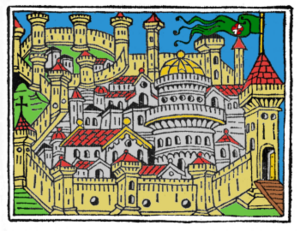Festistatta
Festistatta (Latin: Arx Paludis or Arx) was a city on the east frontier of the Telseric Empire. It lay on the north bank of the Langewaser as it debouches into the Great Marsh. The administrative seat of the Letaran provinces, it became the capital of republican Letara in the mid-eighth century.
History
Festistatta was founded in the early third century as a garrison town on the eastern border of the Telseric Empire, watching over the approaches through the Great Marsh. The town was named Arx Paludis, Latin meaning 'citadel of the marsh.' In the course of the following century, the border was pushed eastward to encompass the entire marsh. Arx Paludis' importance as a military base declined at the same time as it grew to become a centre for trade with tribes outside the empire. Nevertheless, its importance was little more than regional as an administrative centre.
The Letaran provinces emerged relatively unscathed following the breakup of the empire, although much of the territory regressed to tribalism. Arx Paludis was now more commonly known simply as Arx or, in the native Lethric language, Festistatta, 'strong city,' and continued to hold some influence over its immediate hinterland and the nearer islands. Festistatta, then little more than a trading post surrounded by its own ruins, was raided and briefly conquered by the northern Drei warlord Ariwulf in 763, who then wintered there with his fleet. The Letaran tribes slew Ariwulf in battle the following spring and proclaimed their city an independent republic. The Stainberga, an abandoned church which had been used as a warehouse by Letaran merchants, was commissioned as the city's senate-house.
The newly independent city sent out surveyors to delimit their republic's borders. The bishop of Palus Orientalis assisted in organising the diocese under the new republican government, which in return endorsed Christianity as the religion of the state. Festistatta's first duke and council began ambitious projects to rebuild their ruined city. By the start of the ninth century, much of the Via Letarana had been repaved and a new canal was dredged into Festistatta, bringing in substantial wealth, while the marshland north of the city was cultivated in expansive farm estates, or latifundia, for the first time in three hundred years.
The city's legal and administrative archive was rebuilt in the 940s to house a growing collection of texts from across the empire. The gold-roofed Great Archives became famous across Telseris as the continent's greatest store of knowledge since the collapse of the empire and became an important destination for scholars.
